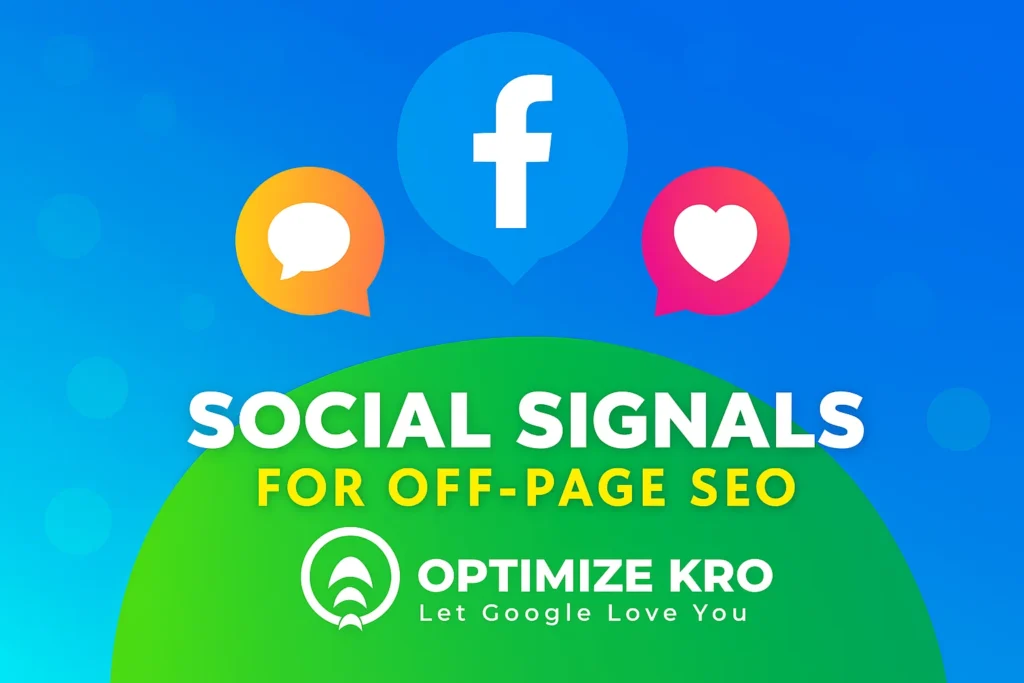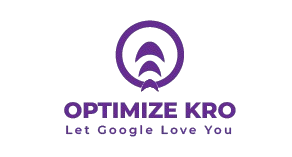In the ever-evolving world of Search Engine Optimization (SEO), off-page SEO techniques have gained significant attention. One such factor that has emerged as a crucial element in the ranking algorithms of search engines is social signals. These are indicators that help search engines understand the popularity, relevance, and authority of a particular website or webpage based on its interactions on social media platforms.
- Table of Contents
- 1. What Are Social Signals?
- 2. Why Do Social Signals Matter for SEO?
- 3. Types of Social Signals
- 4. How Social Signals Affect Off-Page SEO
- 5. Best Practices to Leverage Social Signals for SEO
- 6. How to Measure Social Signals for SEO
- 7. Do Social Signals Directly Impact Rankings?
- 8. Social Signals and Link Building
- 9. Tools for Measuring Social Signals
- What Our Clients Say
- 10. Common Mistakes to Avoid with Social Signals

In this guide, we will explore everything you need to know about social signals for off-page SEO, including the following:
- What social signals are
- Why social signals matter
- How to leverage social signals to improve SEO
- A comprehensive FAQ section
Table of Contents
- What Are Social Signals?
- Why Do Social Signals Matter for SEO?
- Types of Social Signals
- Social Media Engagement
- Social Shares
- Social Mentions
- How Social Signals Affect Off-Page SEO
- Best Practices to Leverage Social Signals for SEO
- Build an Active Social Media Presence
- Engage with Your Audience
- Encourage Social Shares
- Monitor Social Mentions
- How to Measure Social Signals for SEO
- Do Social Signals Directly Impact Rankings?
- Social Signals and Link Building
- Tools for Measuring Social Signals
- Common Mistakes to Avoid with Social Signals
- FAQs about Social Signals and SEO
1. What Are Social Signals?
Social signals refer to the interactions and engagements a piece of content receives on social media platforms. These can include likes, shares, comments, follows, and mentions across platforms like Facebook, Twitter, Instagram, LinkedIn, and others. The idea is that search engines may consider these social signals as a metric to gauge a website’s popularity, trustworthiness, and relevance. While social signals are not officially confirmed as a ranking factor by Google, their impact cannot be overlooked.
2. Why Do Social Signals Matter for SEO?
The importance of social signals in SEO can be attributed to several reasons:
- Increased Visibility: The more people interact with your content, the more visibility your website gains.
- Indirect SEO Benefits: Social signals can lead to an increase in backlinks, traffic, and brand awareness, all of which contribute to better SEO.
- User Engagement: High engagement signals trust and authority, which are essential for search engine algorithms.
- Search Engine Results: Although Google doesn’t officially use social signals for rankings, there is strong evidence suggesting that social media activity influences search engine results indirectly.
3. Types of Social Signals
3.1 Social Media Engagement
Engagement includes user interactions such as likes, shares, comments, and clicks. Platforms like Facebook, Twitter, and Instagram offer different ways for users to engage with content. These interactions often result in increased visibility, which could lead to more organic traffic.
3.2 Social Shares
When a user shares your content on their social media, it acts as a vote of confidence. Content that is shared widely on platforms like Facebook, LinkedIn, or Twitter is likely to be seen as valuable or interesting, increasing its chances of ranking.
3.3 Social Mentions
A social mention occurs when your brand, product, or content is referenced or tagged on social platforms. While mentions do not always involve a direct interaction, they signal to search engines that people are talking about your content, which could impact your SEO positively.
4. How Social Signals Affect Off-Page SEO
Off-page SEO refers to all the activities that occur outside of your website but influence your site’s ranking on search engine results pages (SERPs). Social signals play an important role in off-page SEO for several reasons:
- Increased Backlinks: Social shares and mentions may lead to more people linking to your content, which is crucial for off-page SEO.
- Brand Awareness: A strong social media presence can enhance your brand’s credibility and trustworthiness, key factors in off-page SEO.
- Content Virality: If your content goes viral, it increases the likelihood of earning natural backlinks, which is one of the primary components of off-page SEO.
5. Best Practices to Leverage Social Signals for SEO
5.1 Build an Active Social Media Presence
Start by creating profiles on major social media platforms like Facebook, Twitter, Instagram, and LinkedIn. Regularly share relevant and valuable content with your followers.
5.2 Engage with Your Audience
Respond to comments, participate in conversations, and encourage user-generated content. Social media engagement is a key component of generating social signals.
5.3 Encourage Social Shares
Provide content that is highly shareable. This can include informative blog posts, infographics, videos, and interactive content that resonate with your audience.
5.4 Monitor Social Mentions
Tools like Mention or Google Alerts can help you track whenever your brand is mentioned on social media. Engaging with these mentions can boost your online presence.
6. How to Measure Social Signals for SEO
Although there isn’t a tool specifically dedicated to measuring social signals for SEO, there are several tools that can help track social media performance:
- Google Analytics: Track traffic from social media to your website.
- Hootsuite: Monitor engagement and mentions on various social platforms.
- BuzzSumo: Analyze the performance of your content across social media.
- Mention: Monitor your brand mentions on social media platforms.
7. Do Social Signals Directly Impact Rankings?
While Google hasn’t officially confirmed that social signals directly impact SEO rankings, many SEO experts agree that they do influence rankings indirectly. Social signals lead to increased brand visibility, which can lead to more clicks and shares, ultimately impacting a page’s SEO performance. However, it is crucial to remember that other factors such as content quality, backlinks, and website optimization are more influential.
8. Social Signals and Link Building
Link building is one of the most essential off-page SEO strategies. Social signals can play a key role in link building:
- Increased Exposure: Social media can increase the exposure of your content, leading to more people discovering and linking to it.
- Increased Backlinks: High engagement on social media increases the chances of your content being linked by other websites and blogs.
- Brand Authority: A strong social presence helps establish your brand as an authority in your niche, attracting high-quality backlinks.
9. Tools for Measuring Social Signals
Here are some popular tools for tracking social signals:
| Tool | Purpose | Platform |
|---|---|---|
| Hootsuite | Social media management and analytics | Facebook, Twitter, LinkedIn, Instagram |
| BuzzSumo | Content analysis and social performance | All major social platforms |
| Mention | Monitor brand mentions and social listening | Twitter, Facebook, Instagram, Blogs |
| Google Analytics | Track social traffic to your website | Facebook, Twitter, LinkedIn |
| SocialBee | Social media scheduling and engagement | Facebook, LinkedIn, Instagram |
What Our Clients Say
Trusted by contractors and local businesses for proven Local SEO Services.
John M. – General Contractor
“These guys transformed my Google Maps ranking. More calls, more local leads, and better visibility!”
Sarah L. – Roofing Business
“Within 3 months, my business went from page 3 to the top 3 listings. Highly recommend their Local SEO service!”
David K. – Plumbing Services
“Affordable and effective SEO. My local service calls doubled in less than 90 days.”
10. Common Mistakes to Avoid with Social Signals
- Ignoring Engagement: Simply posting content without engaging with followers won’t yield results.
- Over-Promotion: Constantly pushing sales-driven content may result in disengagement.
- Inconsistent Posting: Irregular posting leads to a lack of engagement and social signals.
- Lack of Visual Content: Social media thrives on visually appealing content such as images, infographics, and videos. Failing to use these elements can reduce your content’s shareability.
Google hasn’t confirmed this, but social signals can indirectly affect rankings by increasing traffic, backlinks, and engagement.
No. While social signals are important, they cannot replace traditional link-building. Both strategies should be used together for optimal SEO results.
You can increase social signals by creating shareable content, engaging with your audience, and promoting your social media profiles.
There is no one-size-fits-all approach. However, posting consistently and at optimal times can increase engagement, which indirectly impacts SEO.
Backlinks are still more crucial for SEO, but social signals help boost visibility and can lead to more backlinks.
By integrating social signals into your off-page SEO strategy, you can significantly enhance your site’s visibility, drive more traffic, and ultimately improve its ranking in search engine results pages. Keep in mind that social signals should be used in conjunction with other SEO strategies like quality content creation, technical SEO, and link building for the best results.

Gulfam Qamar is a seasoned Local SEO expert with a proven track record of helping businesses boost their online visibility and dominate local search results. With deep expertise in Google Business Profiles, on-page optimization, and local citation strategies, Gulfam helps brands connect with nearby customers and grow sustainably. When he’s not optimizing websites, he’s sharing actionable SEO tips and insights to empower small businesses in the digital space.

